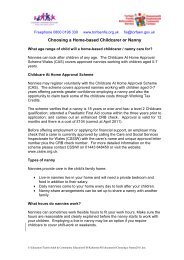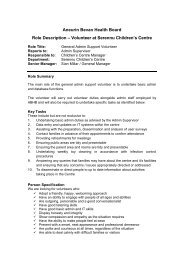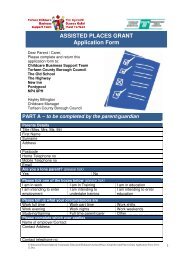Food and Health Guidelines - Torfaen Family Information Service
Food and Health Guidelines - Torfaen Family Information Service
Food and Health Guidelines - Torfaen Family Information Service
You also want an ePaper? Increase the reach of your titles
YUMPU automatically turns print PDFs into web optimized ePapers that Google loves.
4. Developing positive eating habits<br />
<strong>Health</strong>y weight<br />
management<br />
The percentage of pre-school children<br />
becoming overweight is increasing <strong>and</strong><br />
is of concern. The development of early<br />
obesity has important implications for future<br />
health <strong>and</strong> is associated with an increased<br />
risk of cardiovascular disease, diabetes <strong>and</strong><br />
certain cancers.<br />
Potential factors associated with<br />
the development of obesity in<br />
childhood are:<br />
• High birth weight<br />
• Rapid growth in infancy<br />
• Parental obesity (one or both parents)<br />
• Low physical activity<br />
• Low socio-economic status<br />
• Excessive television watching<br />
For good health <strong>and</strong> optimal growth it is<br />
important to get the balance right between<br />
energy consumed in food <strong>and</strong> energy<br />
expended. Children who are regularly active<br />
are able to achieve a better energy balance<br />
than children who are less physically active. 26<br />
Childcare settings have an important role to<br />
play in trying to establish a healthy dietary<br />
pattern during early childhood.<br />
Provision of healthy<br />
meals <strong>and</strong> snacks<br />
<strong>Food</strong> provides children with energy to<br />
enable them to grow, develop <strong>and</strong> be<br />
active. Energy comes from foods containing<br />
carbohydrate, fat <strong>and</strong> proteins but mainly<br />
from fat <strong>and</strong> carbohydrate. A requirement<br />
for an individual child depends on the age,<br />
size, <strong>and</strong> gender, rate of growth <strong>and</strong> level<br />
of activity.<br />
More of the energy should come from<br />
starchy carbohydrates such as potatoes,<br />
rice, pasta <strong>and</strong> breakfast cereal <strong>and</strong> less<br />
from confectionery <strong>and</strong> soft drinks as these<br />
foods are high in sugar but provide few other<br />
nutrients <strong>and</strong> are not filling. It is important<br />
to note that children do not need sugar<br />
for energy.<br />
Milk<br />
Some children drink excessive amounts of<br />
milk which can contribute to weight gain.<br />
Milk should only be available at meal or<br />
snack time rather than being freely available.<br />
Children over two could have semi-skimmed<br />
milk as long as they are eating a varied diet.<br />
Portion sizes<br />
Some children gain weight too rapidly if<br />
their portion sizes are too big. If a child<br />
is overweight, it is advisable that second<br />
helpings are not offered unless they are<br />
vegetables, salads or fruit. Ensure there is<br />
always a fruit based dessert available.<br />
3

















